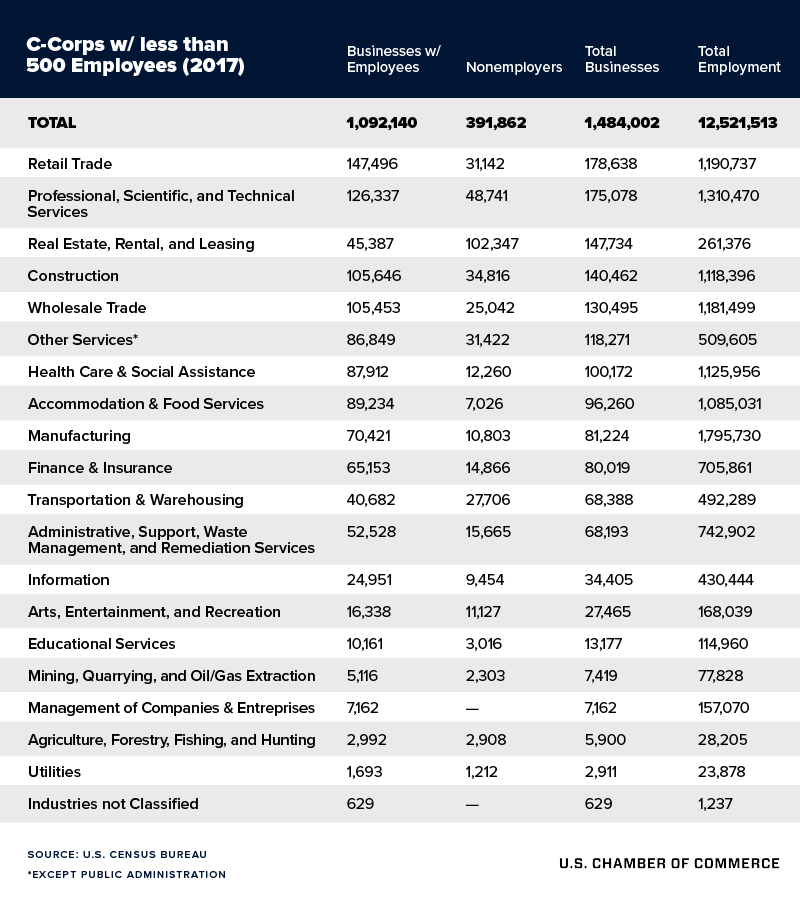Congress is considering raising the corporate income tax rate from 21 percent to 28 percent. Many assume that only big businesses will pay this higher rate. That couldn’t be farther from the truth. In fact, over a million small businesses—those “Mom-and-Pop” retailers, small manufacturers, and professional services firms that often suffered the worst during the pandemic—would also see their tax bills increase significantly. In turn, this would have a negative impact on small businesses’ investment and growth plans and, most critically, hiring and job creation.
There are 1.4 million small businesses (those with 500 employees or less) officially organized as C-Corporations, which means they would pay this higher rate. These small businesses employ almost 13 million American workers across various sectors.
1.4 MILLION SMALL BUSINESSES, EMPLOYING ALMOST 13 MILLION AMERICANS, WOULD PAY THE HIGHER TAX RATE
Hardest hit would be the sort of skilled jobs that politicians love to praise, but often in practice, do too little to support. Manufacturing small business C-Corps employ the most workers out of the group (1.8 million workers). Professional, scientific, and technical services are next (employing 1.3 million), followed by retail (employing 1.2 million).
Most C-Corporations are small businesses and many are very small: over 84% of C-corps have fewer than 20 employees. Small business owner, Michael Canty, is the President of Ohio-based Alloy Precision Technologies, a manufacturing company that employs roughly 85 people and is structured as a C-Corp under the federal tax code. His business would be hit hard by the proposed increase under Biden’s tax plan. Canty warned that the proposed tax increase would make companies like his less competitive in the global marketplace.
“We have already started a hiring freeze. Between the tax increase and what we see as a tough regulatory environment, we have to prepare,” Canty said.
Furthermore, small businesses organized as C-Corps are spread across all industries. Retail trade (179,000) has the most businesses. This is followed by professional, scientific, and technical services firms (175,000); real estate, rental and leasing (148,000); and construction companies (140,000).
Here’s how C-Corporations breakdown by small business sector:
small_biz_c-corps_blog_post.png

The Tax Cuts and Jobs Act of 2017 lowered the corporate rate from 35 percent to its current 21 percent level. It helped spur growth and investment by these 1.4 million C-corporation small businesses—allowing them to grow when the time was right and to save up and weather the storm when the pandemic struck.
Many of these small businesses are just now beginning to return to normalcy: According to the latest MetLife & U.S. Chamber of Commerce Small Business Index, 59% of small businesses believe it will take more than six months to return to normal. Suddenly—and substantially—raising their taxes is one sure way to stop the recovery’s momentum dead in its tracks.
This would be the highest corporate tax rate in the industrialized world and would put U.S. businesses (large AND small) at a severe competitive disadvantage with other technologically-advanced and savvy counterparts across the globe. Higher rates on over a million small businesses would suppress wage growth and job creation for American workers—at a time when one of the few things we can all agree on is the need to strengthen the middle class and create more higher-paying jobs here at home.
The strong economic growth and sharp wage increases for the lowest-earning workers prior to the pandemic were proof the lower tax rate was working as envisioned. Small businesses were a key contributor to this growth. Raising the corporate tax rate would undo the progress made and threaten the strong foundations of this recovery. Let’s keep corporate tax rates where they are, so America’s small businesses can continue to prosper and create the growth and jobs this country needs to keep this recovery going.


